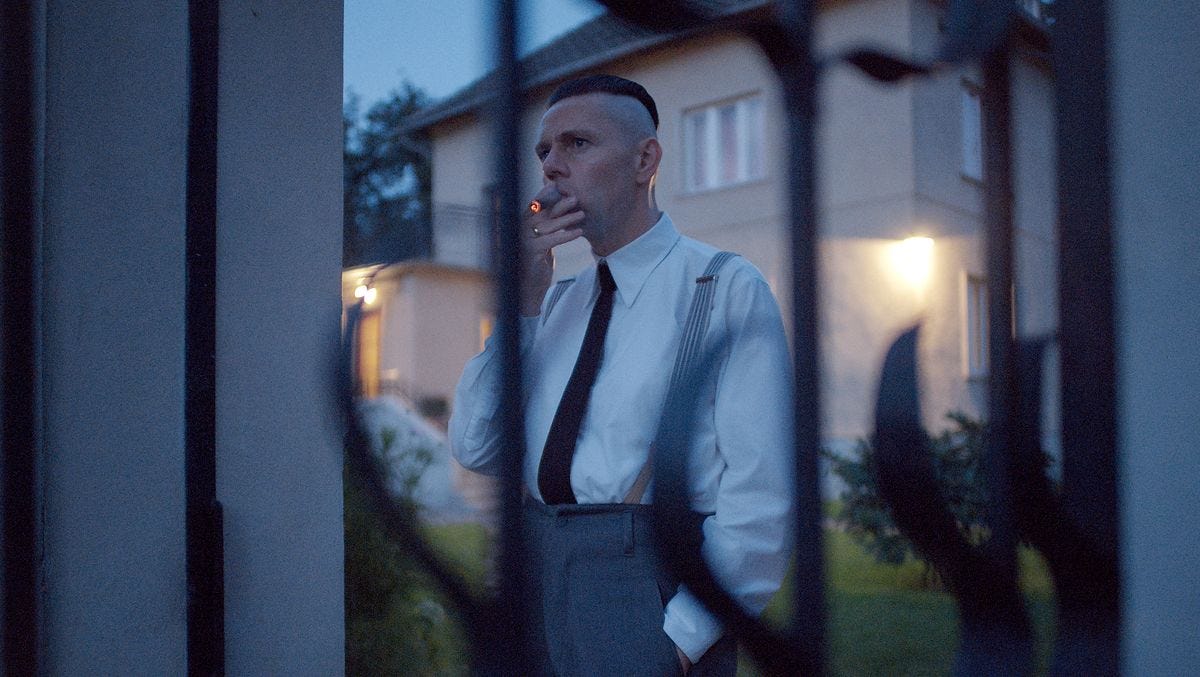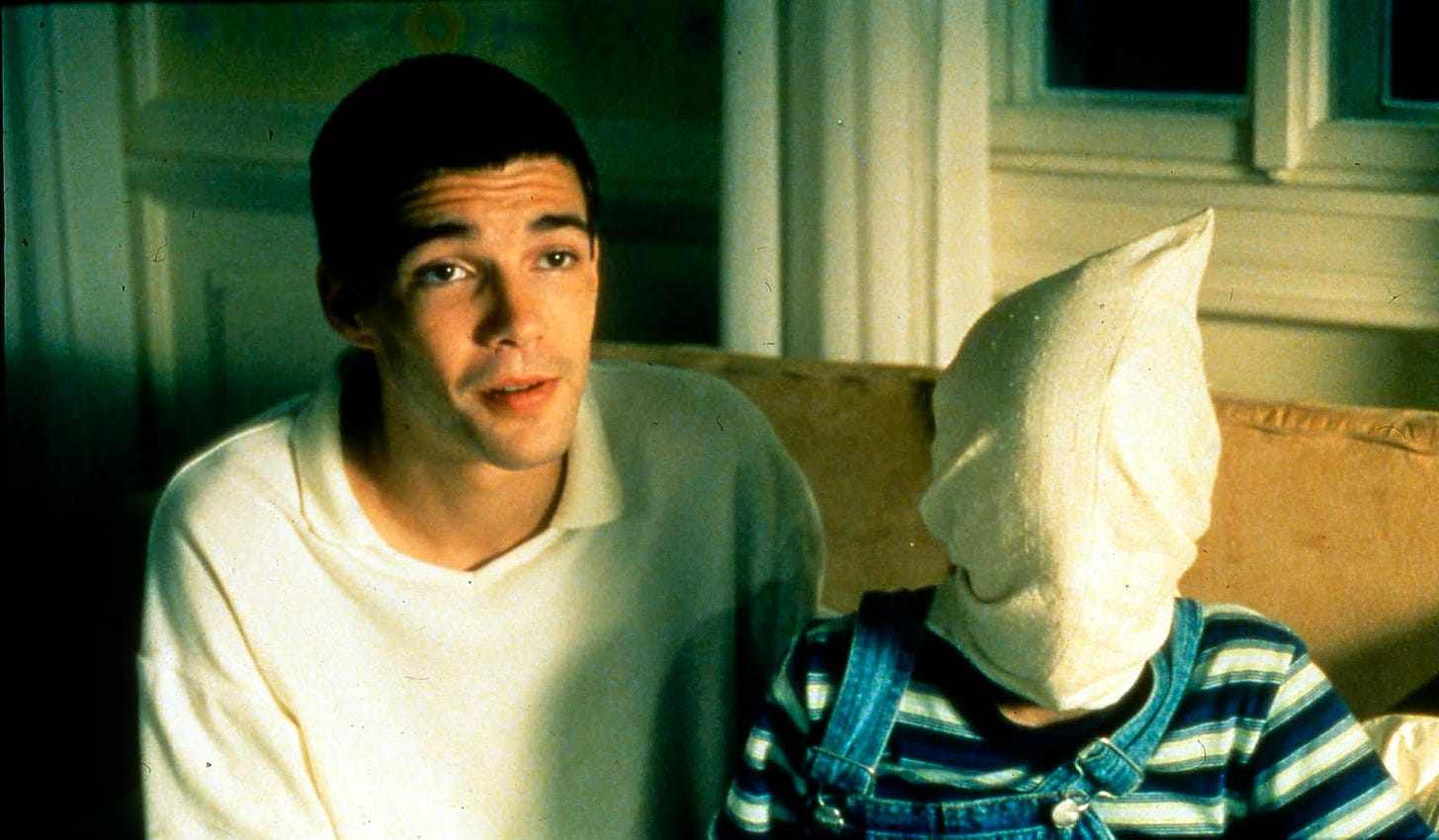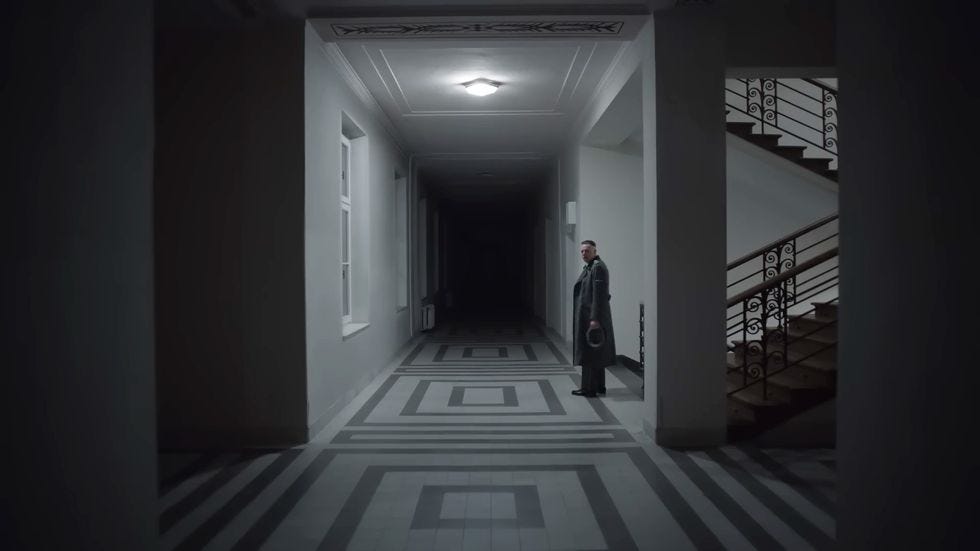Look in the Mirror and See Your Soul
On Jonathan Glazer's 'The Zone of Interest' (2023), Michael Haneke's 'Caché' (2005), and observing evil
Trite conversation and kitchen-sink normality color the grim reality of The Zone of Interest, Jonathan Glazer’s critically acclaimed 2023 film which details the family life of Auschwitz commandant Rudolf Höss (Christian Friedel) as he and his wife Hedwig (Sandra Hüller) attempt to make their dream home next to the concentration camp he commands. Glazer, a shrewd filmmaker, gives us a hook: we never see the atrocities taking place behind the walls that line the Höss’ property. Gardens are tended to, meals are eaten, and children’s books are read within earshot of a genocide, but images of the violence are hidden away. The soundscape, however, reveals something more sinister lurking behind the tranquil facade: faint gunshots crackle through the air, screams are heard in the distance, and, in a particularly chilling sequence, a guard orders a victim drowned — each sound signifies another death. We hear all this but visually, we are only shown the residue: children playing with teeth, smoke rising from a smokestack, ashes being scattered onto a flower garden. It's a Holocaust film, where the Holocaust takes place on the periphery.
The point of this formal limitation becomes apparent within the first few minutes — it is a literalization of Hannah Arendt’s concept of the banality of evil, a living diorama of people carrying on their everyday lives amidst the presence of unfathomable evil. Glazer doesn’t mean to create suspense out of visually obscuring the atrocity, something filmmaker Michael Haneke decried in an interview with the Hollywood Reporter. Similar to its lack of suspense, there is no mystery to The Zone of Interest. The perpetrators of the horror are depicted clearly and early on — we see the Nazi uniforms almost immediately. The full presentation of its context is immediate and straightforward. It’s a single-minded film which aims to create a prolonged physical and formal nightmare, one that immerses the audience in its atmosphere of macabre terror. But while successfully creating this, admittedly, singular visceral sensation, in terms of insight, it is often limited by the banality of its subject matter.
So why is Haneke’s 2005 picture Caché (meaning “hidden” in French) so much more effective at achieving the goal The Zone of Interest sets out for itself, despite delivering it in the genre packaging of a mystery? Both works seek to reveal the evil tolerated and perpetuated by bourgeois society and hidden behind a layer of artificial pleasantries. The Zone of Interest accomplishes this simply: Auschwitz lies beyond the walls of the neatly kept garden, thus everything is infused with this bleak, passive knowledge. Conversely, Haneke, ever the mischievous antagonist of the French white bourgeois class, seeks to be more subversive. The crime of the well-to-do family at the center of Caché’s story is hidden within the film’s narrative and formal operations. It lacks the obviousness of a Nazi uniform or insignia. Watching Caché, one might be totally preoccupied with the family’s escalating paranoia about the mysterious stalker who enters their lives seemingly out of nowhere, to the point where the dormant evil in which they also participate is overlooked entirely. In Caché, perspective is everything and is left to the audience’s discernment.
Caché follows the life of the Laurent family whose quaint upper-class peace is interrupted by the arrival of anonymously sent videotapes. These tapes, shot in grainy analog video, observe their home with unnerving and aggressively static shots. (One can’t help but be reminded of David Lynch’s 1997 thriller Lost Highway, which makes use of a similar plot catalyst and is, somewhat comparably, about the uncovering of domestic evil.) This starts the family (mainly its patriarch, Georges, played by Daniel Auteuil) on a twist and turn-filled investigation to determine the tapes’ origin. The plot’s increasing complexities and added wrinkles — violent, child-like drawings also are mailed to the Laurents’ address — require Georges to delve into his own unspoken, hidden past.
That unspoken, hidden past is eventually revealed: as a child, growing up on his family’s estate, young Georges (Hugo Flamigni) had a competitive and slightly envious relationship with Majid (Malik Nait Djoudi), who was the son of Algerian farm hands who worked on the land. Already, the dynamic between the white upper-class land-owning gentry and the Algerian working class are established and are felt, even in the interpersonal struggles of children. This, of course, is also further contextualized within France’s complex, oppressive imperial history with Algeria.
Georges’ family had planned to adopt Majid, something that Georges was immediately opposed to. In an effort to thwart his parents’ plans, he framed Majid for beheading one of the family’s chickens in an effort to paint him as “violent,” resulting in both Majid and his family being sent from the property. Often referenced, though very subtly, in the film, is the 1961 Paris Massacre in which French police killed dozens of Algerian migrants (at least). It’s not hard to view this episode from Georges’ childhood as a kind of parable for this violent history. The level of clarity with which this is perceived, might vary from viewer to viewer, hinging on their consciousness of France’s history with Algeria and its people — a marked difference from the Nazism in The Zone of Interest, an almost universally known and recognized evil, at least in the West.
In terms of how the two films tell a story beyond the frame, there are commonalities. In a key dinner scene in Caché, the TV details the suffering of modern-day immigrants to France — something easily tuned out by the film’s foregrounded mystery — but this is, in fact, exactly what is “hidden,” the actual crime and perversion that, according to Haneke, is taking place. Caché is also lensed with Haneke’s trademark dryness. Long static shots bring a deadpan indifference to the psychological suffering on display. Glazer’s surveillance camera-esque positioning operates similarly, and owes a lot to Haneke’s form, but is executed with more passivity. Glazer wants us to be unaware of the filmmaker and this is the key element where the films diverge. Haneke engages the audience as an agent of formal terror on the bourgeois class, something that The Zone of Interest avoids.
This difference in approach is partially due to Glazer’s film needing to succeed on the Höss family’s comfort. But Haneke is not content to rest with this style of critique. As the mystery of Caché unfolds and the suspense grows, it’s easy to develop the sensation that we are the perpetrators of this terror, that we, in a sense, “inhabit” the camera. The observational gaze of the stalker becomes our own. The Zone of Interest, while taking on the techniques of the voyeur, feels less voyeuristic because it lacks that penetrating intrusion — there is too much comfort in its observation. Things happen within the frame but the characters and our interpretation of their actions are not affected by it. Haneke, following in the tradition of Hitchcock and De Palma, filmmakers who both reject and embrace their genre concerns, seeks to saddle the viewer with this perverse baggage.
It’s notable too that this is not unlike Haneke’s 1997 masterpiece Funny Games, where the violent action by the audience lies in not hitting the eject button (or walking out of the theater). But with Caché, the filmmaker encourages our probing instead of rebuking it — we ultimately want answers to the mystery at the cost of the Laurent family’s suffering (and, paradoxically, our own anxiety) and in doing so, there is an unspoken eagerness in seeing the bourgeois class infected with terror. Haneke masterfully links the two inexorably, something Glazer does not achieve or even aspire to. Furthermore, we can, despite the accurate assessment that The Zone of Interest is a cautionary tale for the present day, dismiss its indictments. The Nazi regime is so evil, so banal, it has arguably become a cinematic cliché. For all its transparent allegorical nature, the film struggles to transcend the fact that, in the realm of cinema, Nazism is a regime of pure artifice and presentation — the swastika has become a cover for the audience’s culpability.
This is ultimately what holds The Zone of Interest back from true potency. It is an extraordinarily well-made film but its observations are too well-trodden to be resonant in a way that is challenging or dangerous. Audiences experience the mastery of Glazer’s craft and conflate it with new meaning. Its effectiveness, however, is more akin to a theme park ride, where the Holocaust forms a noxious sensory experience, one where the viewer is acutely aware of a clearly defined, contemptible evil and its consequences. The pleasant Laurent family is more relatable, their crimes less transparently evil, and our own relationship to both more complicated. The Zone of Interest is a film of villains to be scorned at but with Caché, Haneke holds up the mirror and hands us the ax. He reveals the relatable paranoia of his Cannes audience and commands them to peel back the layers of the Laurent family’s secrets.
Haneke’s secret hope, of course, is that we miss all this meaning entirely — true, he goes as far as he can to translate the subtext into the literal, the infamous throat slashing scene being as direct as he gets — but there is an unuttered accusation that Haneke makes with Caché, namely that audiences will overlook the Laurent family’s quiet oppression (and eventually their antagonism) because of the nature of the film’s mystery and the anxiety of its paranoia. There is no avenue of escape or refuge in Caché — it is a film that seeks to implicate the audience either as destructive voyeurs or examine where their sympathies and anxieties truly lie. (Some audiences are bound to be guilty on both counts.) Haneke’s films have often tried to shatter the lie that Europe has squashed the Nazi evil after World War II. For him, its ramifications survived and metastasized everywhere, lying dormant in each nook and cranny of modern European society, waiting to be exposed. It is, perhaps, despite indicting the audience for watching it, he also feels justified for terrorizing Funny Games’ Schober family — a brutal uncompromising act of violence that he waited until 2017’s Happy End to give a moral cause to.
Glazer’s ambitions for The Zone of Interest are commendable and its results not without merit. But even so, the ending spares the audience from being incriminated. When Rudolph Höss looks through a portal to the present and beholds his legacy, we are invited by Glazer to demand he change course, for the arc of history’s future to be some consequential altering truth. Of course, it makes no impression on Höss, who descends the stairwell into darkness — in the hands of Haneke perhaps we would descend into that darkness with him. More likely, the camera would already be positioned in shadow and Höss would descend towards us. Glazer’s surveillance camera approach fails him here. The well-established rules dictate the camera cannot uproot and follow him. The difference between Höss’ position and our own is clearly and finally delineated: we are not Höss, nor are we his family. Watching him descend into darkness, the audience can sigh with relief. Höss failed his test but the audience did not.
There is power to the metaphor Glazer gives us for the film’s own nature at the end: when Höss looks into the present, he sees workers wiping the display windows and vacuuming the floors of the Auschwitz museum. They are, in effect, sanitizing history for mass consumption. The reminders of the genocide are locked securely behind perfectly transparent glass panes. Visitors can come into the museum and safely observe history — nothing will suddenly jump from the display case and grab a hold of them. The only threat to peace is the one visitors sign up for: a solemn recognition of a terrible time in history. The Zone of Interest feels very much in line with this experience.
In her excellent piece “Sadomodernism,” which delves into the European arthouse audience’s relationship with Haneke, Moira Weigel interrogates the Haneke (and Von Trier) audience and their embrace of the Haneke-style sadomasochist filmmaker. She correctly diagnoses their fetish for punishment and condemnation and their appraisal of destruction for destruction’s sake. But with The Zone of Interest, we might have a solid argument against a totally passive experience as well. I often think of Georges in Caché, stressed from the pressures of the mystery, taking two sleeping pills to fall asleep. An accusation dangled ominously by Haneke at the audience, who he believes, often do the same to tune out their own culpability and responsibility.
For me, perhaps falling right in line with Weigel’s point about enjoying a $4 espresso in the Angelica Café, the immediacy of Haneke’s destructive approach was missed. Hollywood and its sentimentalists have failed in their attempts to broach such subjects — Glazer’s film is closer to Haneke’s in that it aims to counter the Hollywood approach. Ultimately, though, it is crippled by the banality of its observational scope, regardless of the mastery of its formal execution. The film remains limited by the audio-visual nightmare it conjures, its rendering of what being adjacent to Auschwitz must have felt like. It’s easy to picture audiences imagining a putrid smell to go along with the incredibly calculated and strategically placed gun shots or tendrils of smoke rising in the background, but there is still something secure in its presentation, something it, fatally, shares in common with most films about the Third Reich.
Perhaps, when Höss looked through the portal, he should have seen us to create this sense of immediacy, but the film instead reinforces itself as another self-contained Holocaust film, protecting the audience from any judgements or self-reflections. Sure, we are meant to think of the present day — at the BAFTAs, producer James Wilson directly discussed the film as an exploration of “selective empathy” as it pertains to the ongoing genocide of the Palestinians in Gaza. But the film lacks this directness and its inability to broaden its scope allows this selective empathy to remain intact. Ultimately, The Zone of Interest forms, with its intentionally dispassionate approach and desaturated color grading, another display case through which we can safely perceive the chaos of history and shake our heads in solemn recognition saying “Isn’t it a shame?” while keeping its ugly realities fully and safely in the rearview.
Addendum: Given the controversy that has erupted around The Zone of Interest after Jonathan Glazer’s acceptance speech at the 96th Academy Awards, as well as the fact that Israel’s genocide in Gaza is still ongoing, it feels appropriate to include his words here:
“Thank you to the academy for this honor, and our partners A24, Film4, Access, The Polish Film Institute, to the Auschwitz Birkenau, the state museum for their trust and guidance, to my producers, actors, collaborators. All our choices were made to reflect and confront us in the present, not say, ‘look what they did then,’ rather, ‘look what we do now.’ Our film shows where dehumanization leads, at its worst. It shaped all of our past and present. Right now we stand here as men who refute their Jewishness and the Holocaust being hijacked by an occupation which has led to conflict for so many innocent people…Whether the victims of October the seventh in Israel, or the ongoing attack on Gaza, all the victims of this dehumanization, how do we resist? Aleksandra Bystroń-Kołodziejczyk, the girl who glows in the film as she did in life, chose to, I dedicate this to her memory and her resistance. Thank you.”









